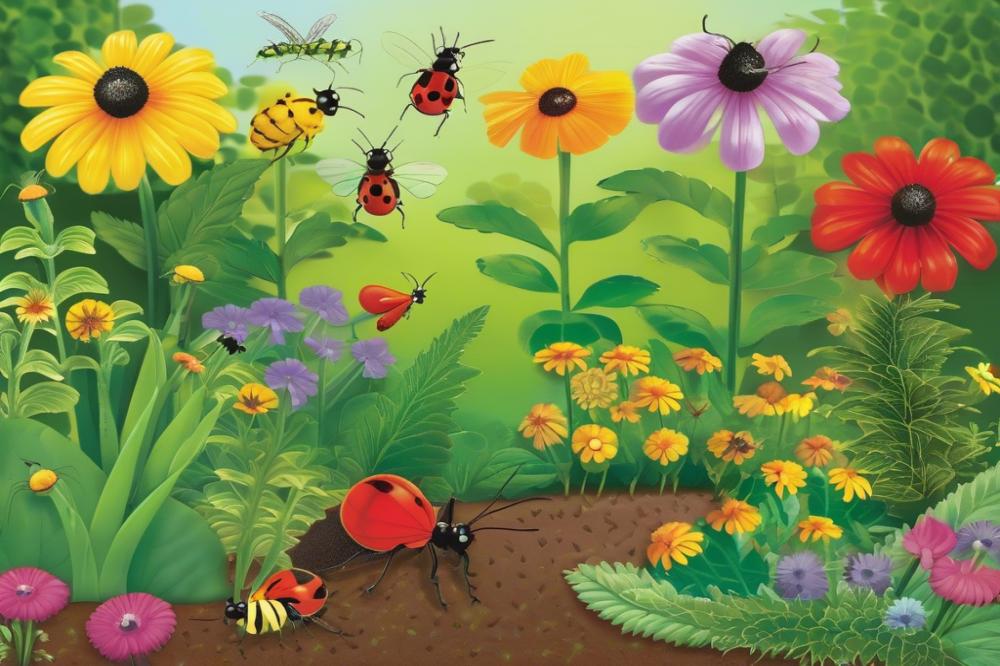Introduction
Every gardener faces challenges from common garden pests. These unwelcome visitors can quickly ruin hard work and reduce yields. Aphids, spider mites, and caterpillars are some of the most frequent culprits. They feed on plants, sucking out vital nutrients and causing damage that can be difficult to reverse. Without proper intervention, these pests can overwhelm even the healthiest garden.
pest control becomes crucial for anyone who wants to maintain a thriving garden. The battle against these invaders requires careful planning and diligent action. Many gardening enthusiasts seek methods to combat pests that do not rely on harmful chemicals. natural methods have gained popularity in recent years. They not only protect plants but also promote a healthier environment.
Biological control is one effective strategy in this ongoing fight. By introducing predatory insects, gardeners can keep pests at bay while maintaining the ecosystem balance. Ladybugs and lacewings are two examples of beneficial insects that play a vital role in this process. They consume aphids and other pests, helping to manage numbers organically.
Incorporating beneficial insects into gardening practices aligns with the principles of organic gardening and sustainable gardening. This approach benefits not just plants but also pollinators and the entire garden ecosystem. Ultimately, understanding how these predators work can significantly improve any gardener’s pest control efforts.
Understanding Beneficial Insects


Beneficial insects are creatures that help maintain the balance of a healthy garden. These organisms play a key role in pest control, often reducing the need for chemical pesticides. They contribute to an ecosystem that thrives naturally, making gardens vibrant and productive. Many gardeners recognize the importance of using natural methods to manage unwanted pests.
Types of Beneficial Insects in the Garden
Various types of insects contribute positively to gardens. For instance, ladybugs are well-known for their appetite for aphids. These small beetles can consume thousands of these pests throughout their life cycle. Lacewings also belong to this group and are equally effective. The larvae of lacewings are voracious predators, targeting harmful insects like caterpillars and mealybugs.
Pollinators, such as bees and butterflies, fall under a different category. While they are not predators, they play a vital role in plant reproduction. Their activities directly affect fruit and vegetable production. Without them, many gardens would struggle to yield crops. Thus, promoting a diverse insect community supports overall garden health.
Role of Predatory Insects in Biological Control
Predatory insects are critical players in biological control. They help keep pest populations in check through direct predation. When spider mites or whiteflies invade, these predators spring into action. This natural approach minimizes damage to plants and promotes sustainable gardening practices. Gardeners often appreciate this method since it aligns with organic gardening principles.
By supporting these predatory movements, we create an equilibrium in our gardens. Healthy insect populations lead to less reliance on synthetic sprays. In essence, maintaining this balance is essential for thriving plants. As conflicts between pests and plants arise, predators dutifully step in to restore order.
Key Beneficial Insects


Ladybugs: Their Role in Controlling Aphids and Other Pests
Ladybugs are a gardener’s best friend. These small beetles primarily feed on aphids, which are notorious for damaging plants. One ladybug can consume up to 50 aphids a day. They are particularly useful in keeping aphid populations in check. When their numbers rise, ladybugs swoop in and provide natural pest control. These insects also eat other soft-bodied pests, like mites and mealybugs. Including ladybugs in your garden supports organic gardening methods. Their presence contributes to an ecosystem balance that benefits the entire garden.
Lacewings: Benefits and Pest Management Capabilities
Lacewings boast a delicate appearance. Yet, they are fierce predators. Adult lacewings don’t consume pests, but their larvae certainly do. Lacewing larvae can eat up to 200 aphids in a single week. That makes them fantastic allies in pest management. Beyond aphids, they also target thrips, mites, and caterpillars. Embracing lacewings in your garden promotes sustainable gardening. They help maintain a healthy environment where plants can thrive without harmful chemicals.
Other Notable Predatory Insects and Their Functions
Many other predatory insects play a significant role in biological control. For instance, praying mantises are well-known hunters. They can take down a variety of pests, including flies, moths, and even small rodents. Another beneficial insect, the soldier beetle, feeds on pest larvae and aphids. Each of these creatures contributes to the overall health of the garden. Watching them can be as fascinating as seeing pollinators at work. By fostering a diverse range of predatory insects, gardeners can minimize pest issues while promoting an organic system that enhances plant growth.
Ecosystem Balance and Natural Pest Control


Maintaining ecosystem balance in gardens is vital. Healthy gardens thrive when all components work together. This balance allows plants, insects, and soil to support each other. When the harmony is disrupted, problems arise. Unchecked pests can destroy plants. That’s where natural pest control methods come into play.
Natural methods, such as biological control, utilize the garden’s own resources. Predatory insects like ladybugs and lacewings help keep pest populations in check. These small creatures consume aphids, mites, and other unwanted visitors. Gardens can become vibrant and fruitful when these beneficial relationships flourish. They not only reduce the need for chemical pesticides but also promote sustainable gardening practices.
Interactions between these beneficial species and garden health are crucial. They act as natural allies, promoting organic gardening efforts. Pollinators also play a significant role in this ecosystem. Healthy plants attract beneficial insects, while healthy insects improve plant vitality. When insects thrive, the entire garden benefits. It creates a cycle of growth that leads to a thriving environment.
In essence, relying on the natural balance of a garden can yield tremendous rewards. Cultivating a diverse environment ensures pest control without harsh chemicals. Gardeners can support this balance by planting a variety of flowers and herbs. These plants not only attract desirable insects but also provide food sources for them. Understanding and embracing this ecosystem can lead to healthier gardens and better yields.
Encouraging Beneficial Insects in the Garden


Creating habitats for beneficial insects is an essential part of natural pest control. Start by providing areas for these predatory insects to thrive. Natural materials like logs, stones, and dried leaves can offer shelter. Consider leaving some areas of your garden a little wild. This adds diversity and encourages insect populations to settle.
Plant Choices That Attract Pollinators
Selecting the right plants can make a big difference. Flowers such as dill, fennel, and yarrow attract ladybugs and lacewings, which are effective predators of aphids. Nectar-rich plants like sunflowers and zinnias draw in a variety of pollinators. These insects not only help with pest control but also enhance your garden’s beauty. Diverse planting helps maintain ecosystem balance, benefiting both plants and insects.
Organic Gardening Practices
Utilizing organic gardening techniques can significantly enhance the presence of beneficial insects. Avoid chemical pesticides, as they can harm the good bugs along with the bad. Instead, look into biological control methods. Introducing predatory insects such as ladybugs can dramatically reduce pest populations. Regular composting can improve soil health and create a more inviting environment for these helpful creatures.
Mulching is another great technique for sustainable gardening. It maintains moisture in the soil and provides a habitat for insects. When you focus on building a healthy ecosystem, everything works together harmoniously. Using organic fertilizers can also promote the growth of plants that attract these beneficial insects.
Combining Beneficial Insects with Other Pest Control Methods
Integrating beneficial insects with chemical treatments and cultural pest control techniques can create a more effective strategy for managing garden pests. Many gardeners find success when they combine these approaches. For instance, adding ladybugs and lacewings can significantly reduce pest populations without harming the crops. Predatory insects naturally help control aphid and caterpillar outbreaks, reducing the need for chemical alternatives.
The advantages of using a holistic approach in pest management are numerous. This method promotes ecosystem balance, allowing for a healthier garden environment. Gardens that embrace sustainable gardening practices often see better long-term results. Pollinators thrive alongside beneficial predators, leading to healthier plants and bountiful harvests.
One case study involves a community garden that struggled with insect infestations. The gardeners introduced ladybugs, which effectively managed the aphid population. Simultaneously, they implemented organic gardening techniques like crop rotation and proper irrigation. As a result, they successfully reduced the need for chemical pesticides while improving overall plant health.
Another example can be found in a local farm where lacewings were introduced to combat whiteflies. Farmers noticed a remarkable decline in the whitefly population after just a few weeks. By utilizing both biological control and cultural practices, such as maintaining diverse plant species, these farmers achieved sustainable pest control without relying solely on harsh chemicals.
The Path to a Thriving Garden Ecosystem
In summary, the role of helpful insects is vital for keeping garden pests in check. They offer a natural solution, reducing the need for chemical interventions. These tiny allies can significantly improve plant health and enhance biodiversity in your space. When you foster their presence, you create a sustainable environment that benefits all aspects of your garden.
Transitioning to organic and sustainable gardening practices is essential. Begin by creating a welcoming habitat for these beneficial creatures. Plant a variety of flowers and herbs that attract them. Avoid harmful pesticides that disrupt this delicate balance. Instead, explore natural methods to tackle pest problems when they arise.
Final thoughts emphasize the importance of nurturing a balanced ecosystem. This approach leads to long-term success in your gardening endeavors. Small changes can yield huge benefits. Engage with your local environment and support the insects that help keep your plants healthy. Together, you can create a flourishing garden that stands the test of time.



